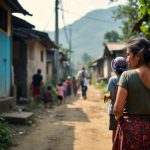Human trafficking remains one of the most pressing human rights issues in Northern Thailand, where vulnerable populations, particularly women and children, are often exploited for labor and sexual purposes. The Development and Education Program for Daughters and Communities (DEPDC) has been at the forefront of combatting trafficking in the region for decades. Despite significant successes, the organization continues to face numerous challenges in its efforts to eradicate this complex issue.
Understanding the Multifaceted Nature of Human Trafficking
Human trafficking in Northern Thailand is driven by a variety of factors, including poverty, lack of education, economic disparities, and social inequalities. The region’s proximity to neighboring countries such as Myanmar, Laos, and Cambodia also makes it a hotspot for cross-border trafficking. Traffickers exploit these vulnerabilities, often targeting individuals who are desperate for work or a better life.
DEPDC’s work involves not only rescuing and rehabilitating victims but also addressing the root causes that make individuals susceptible to trafficking in the first place. However, the multifaceted nature of trafficking means that tackling the issue requires a comprehensive and multi-pronged approach.
Key Challenges Faced by DEPDC
- Geographic and Cultural Barriers:
- Northern Thailand’s mountainous terrain and remote villages make it difficult for DEPDC to reach all at-risk populations. Additionally, cultural barriers, including language differences and deeply ingrained social norms, can hinder communication and trust-building with local communities. These challenges make it harder to identify and assist trafficking victims.
- Limited Resources:
- Like many non-governmental organizations, DEPDC operates with limited financial and human resources. The scale of the trafficking problem often outstrips the available resources, making it challenging to provide comprehensive support to all victims. The organization relies heavily on donations, grants, and volunteer support to sustain its operations, which can be unpredictable and insufficient at times.
- Corruption and Weak Law Enforcement:
- Corruption within law enforcement and government agencies is a significant obstacle in the fight against trafficking. Traffickers often operate with impunity, protected by corrupt officials who either turn a blind eye or actively participate in the trade. Even when traffickers are apprehended, weak legal frameworks and insufficient penalties can result in minimal consequences, allowing the cycle of exploitation to continue.
- Trauma and Rehabilitation Challenges:
- Trafficking survivors often suffer from severe physical and psychological trauma, requiring long-term rehabilitation and support. DEPDC’s shelters provide critical care, but the process of healing is complex and resource-intensive. Additionally, reintegrating survivors into their communities or finding safe alternative placements can be challenging, especially in cases where returning home is not an option due to stigma or ongoing risks.
- Adapting to Changing Trafficking Tactics:
- Human traffickers are constantly adapting their methods to evade detection and exploit new vulnerabilities. This includes using technology to recruit and control victims, as well as shifting their operations to avoid areas where anti-trafficking efforts are more concentrated. DEPDC must continuously evolve its strategies to stay ahead of traffickers, requiring ongoing training, research, and collaboration with other organizations.
DEPDC’s Strategies for Overcoming Challenges
Despite these challenges, DEPDC remains committed to its mission and has developed innovative strategies to overcome obstacles in the fight against human trafficking.
- Building Strong Community Networks:
- DEPDC works closely with local communities to build trust and establish strong networks of support. By training community leaders, teachers, and parents to recognize the signs of trafficking and report suspicious activities, DEPDC is able to extend its reach into even the most remote areas. Community involvement is crucial for early intervention and prevention.
- Collaborating with Law Enforcement and NGOs:
- DEPDC partners with law enforcement agencies, other NGOs, and international organizations to enhance its effectiveness. These collaborations facilitate the sharing of information, resources, and best practices, enabling a more coordinated response to trafficking. Advocacy efforts also focus on strengthening legal frameworks and pushing for harsher penalties for traffickers.
- Focus on Education and Empowerment:
- Education is a cornerstone of DEPDC’s approach to preventing trafficking. By providing education and vocational training to at-risk populations, DEPDC empowers individuals to pursue legitimate opportunities, reducing their vulnerability to exploitation. The organization also conducts awareness campaigns to educate communities about the dangers of trafficking and the importance of gender equality.
- Holistic Rehabilitation Programs:
- DEPDC’s rehabilitation programs for trafficking survivors are holistic, addressing not only physical needs but also emotional and psychological recovery. The organization provides counseling, healthcare, education, and skills training, helping survivors rebuild their lives and regain their independence. DEPDC also works to create supportive environments that reduce the stigma associated with trafficking.
Looking Forward: The Path Ahead
Combatting human trafficking in Northern Thailand is a long and difficult journey, but DEPDC’s unwavering commitment and innovative approaches provide hope for the future. The organization’s ability to adapt to changing circumstances, build strong community ties, and advocate for systemic change is crucial in overcoming the challenges it faces.
Continued support from donors, volunteers, and the international community is essential to sustain DEPDC’s efforts. By addressing the root causes of trafficking, strengthening legal protections, and providing comprehensive care to survivors, DEPDC is helping to create a future where human trafficking is no longer a threat in Northern Thailand.
While the road ahead is challenging, the work of DEPDC offers a model of resilience and determination in the fight against human trafficking. By learning from these challenges and continuing to innovate, there is hope that the cycle of exploitation can be broken, and every individual can live free from fear and abuse.


